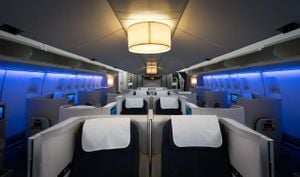Nasa is currently facing challenging decisions as two of its astronauts, Sunita Williams and Butch Wilmore, find themselves seemingly trapped aboard the International Space Station (ISS). Their mission was initially planned for just eight days, but after enduring several technical difficulties, they could remain there until February 2025.
The Starliner spacecraft launched on June 5 with Williams and Wilmore, but it didn’t take long for issues to arise. Helium leaks and thruster problems were discovered shortly after they docked with the ISS, forcing NASA to reconsider the safety of their trip back home.
This unanticipated turnaround has not only extended their stay but shifted their daily lives aboard the ISS. While most astronauts experience the thrill and excitement of space travel, Williams and Wilmore have had to adapt to their new roles onboard the station, including some of the more mundane tasks like cleaning toilets.
Nasa’s chief astronaut, Joe Acaba, confirmed the delay could result in the duo spending about eight months on the station. "We've done multiple successful long-duration missions even up to a year," he stated, drawing on past experiences to assure the public of their well-being.
Both astronauts have remained optimistic about their situation, even joking about it. Williams described their extended stay saying, "It's great to be up here, so I'm not complaining," presenting a positive front during remote communications with their families.
Family members also expressed their views, giving insight on morale both on and off the ISS. Wilmore's wife, Deanna, noted, "You just sort of have to roll with it and expect the unexpected,” highlighting the need for adaptability during such stressful circumstances.
Despite the challenges of extended isolation, experts suggest these astronauts' experiences could yield valuable insights for future long-term space missions. After having to navigate technical errors, their adaptability and resilience will likely serve as learning points for upcoming journeys to Mars or beyond.
The psychological and physical toll of extended waiting periods is something experts are closely monitoring. Ruth Ogden and Daniel Eduardo Vigo, researchers on human behavior, noted the effects of being confined to the same environment over long durations—suggesting time perception could cause days to feel like ages.
While waiting can distort one’s sense of time, both astronauts have tasks to perform which helps occupy their minds. Working alongside other crew members, they’ve contributed to various experiments and repairs, turning their shared struggles at least partially productive.
The ISS has about six sleeping quarters—and with twelve astronauts aboard, it means space is tight. Wilmore is currently using spare sleeping arrangements, making the adjustment slightly less comfortable than usual.
Not being able to wear fresh clothes daily has added to the astronauts’ woes. They initially brought enough clothing for their brief stay and must now ration their attire until resupplies can come.
Boeing has faced scrutiny over the mission and its design of the Starliner craft, and officials have reassured the public of the astronauts’ safety. "There's no increased risk" for returning them aboard the Starliner, a representative indicated, indicating confidence in the technology’s direction moving forward.
Meanwhile, NASA is considering alternatives to retrieve the duo, including the possibility of utilizing SpaceX’s Crew Dragon. ", switching spacecraft to SpaceX would involve complicated logistics, such as bumping two other astronauts from their mission, adding layers of complexity to the already complicated situation.
Williams and Wilmore have proved to be incredibly adaptable, remaining resilient throughout their extended mission. Space exploration has its challenges, and now they are part of the story highlighting human endurance and innovation even during unexpected twists.
While the world awaits news of their return, families hope NASA provides answers soon. Meanwhile, the astronauts remain focused, intent on contributing positively through their time on the ISS.



